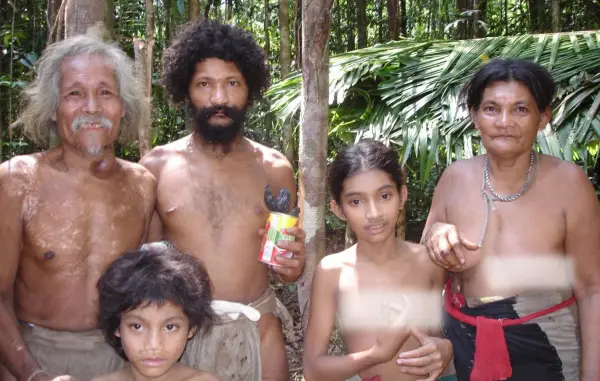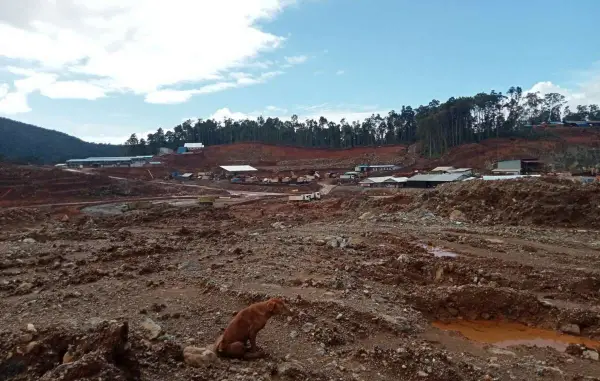An Uncontacted Tribe Is Under Threat Of Being Wiped Out By Mining For Electric Car Batteries
Tags: opinion

One of the earliest pictures of a Hongana Manyawa family.
The current world is quite strict about protecting indigenous tribes that are at risk of extinction. So, the fact that this uncontacted tribe in Indonesia runs a risk of getting wiped out, and yet no governmental interference is in place is quite shocking. According to a recent report, several German and French companies, and Tesla, have been linked to this massive nickel mine- which would be mining for electric car batteries. This is a major mining scheme on the island of Halmahera- which is a plan by Indonesia to set itself up as a major producer of car batteries for EVs. This is also one such plan that sees several companies, including Tesla, pouring in billions of dollars.
Subscribe to Truth Theory on Youtube, new videos every week:
The Hongana Manyawa Tribe Could Be Facing Extinction If Mining For Car Batteries Goes On For 50 Years
While this plan could help in the development of Indonesia as a major developer of EV batteries, the mining of electric car batteries will also destroy large areas of the interior of Halmahera. These forests, according to a survey, are inhabited by 300-500 uncontacted members of the Hongana Manyawa tribe. If the plan is implemented, this tribe will not be able to survive the destruction of their habitat. The Manyawa tribe is one of the last hunter-gatherer tribes in Indonesia that still roam free and uninvaded. But now, they could be facing extinction, as the government in the country will be looking to create sustainable options for people who don’t live in the country.
According to the UNHRC and international law, mining is absolutely illegal- since the uncontacted tribes are not capable of giving them informed, prior, and free consent to this exploitation of their land- something that is necessary, legally, for all forms of developments that could take place on indigenous territories. And yet, the Weda Bay Nickel- which is a joint venture owned partly by Eramet, a mining company from France- has had an enormous concession on this island where they would be mining for electric car batteries. The WBN started mining in 2019, even though they were completely aware that their area under mining overlapped with the uncontacted Hongana Manyawa territory. Since then, large areas of the rainforest- which is home to the tribe, have been destroyed. According to the latest plans of the company, they have intentions of operating here for 50 years.

After-effects of nickel mining in Halmahera, the home of the Hongana Manyawa tribe.
The Land Grab Is Absolutely Immoral, Illegal, and Unethical
A recently contacted woman from the Hongana Wanyama tribe stated, “They are poisoning our water and making us feel like we are being slowly killed.” Another woman went on to state, “I do not give consent for them to take it… tell them that we do not want to give away our forest.” Caroline Pearce, the Director of Survival, also explained, “It’s appalling that electric car companies would sell customers a promise of ‘ethical consumption’, while their supply chains destroy an uncontacted tribe. There is nothing ‘climate-friendly’ about laying waste to the Hongana Manyawa’s rainforest and nothing ‘sustainable’ about causing the deaths of Indigenous people who are living self-sufficiently. Tesla and other electric car companies have an opportunity to live up to their customer’s expectations and to avert a horrific – and illegal – assault on human rights by pledging that none of the minerals they buy ever comes from the lands of uncontacted Indigenous people in Halmahera. Failing to do so would be a statement that the lives of the uncontacted Hongana Manyawa are expendable.”
A man from the tribe that is undergoing chances of extinction due to mining for electric car batteries also stated, “If there is no more forest, then there will be no more Hongana Manyawa.” It is understandable that a growing lack of natural resources has led people to consider other avenues for development. And while electric vehicles are indeed a solution to the problem, it comes with their own environmental snafus. The biggest problem regarding electric car batteries is that they are usually made of metals that are hard to find, such as nickel, lithium, and cobalt. Also, considering how deep the minerals are deposited in the Earth’s surface, invasive mining usually results in indigenous land grabs and ecosystem destruction.
Also Read: HOW CHINA IS MANIPULATING WEATHER AND WHAT ARE THEIR FURTHER PLANS
One of the companies that have invested in mining here is Tesla, which, ironically, has a policy that all forms of material extraction will also involve, “legitimate representatives of indigenous communities and include the right to free and informed consent.” However, Survival has argued that the company has not abided by this code- where they have also given examples of when Elon Musk’s company cut deals with Chinese companies like CNGR Advanced Material and Huayou Cobalt- that have links to such mining in Halmahera, where the Manyawa tribe resides.
Help stop an uncontacted tribe from being wiped out to produce electric car batteries, click here to take action
All Image Credits: Survival International
Leave Comment: